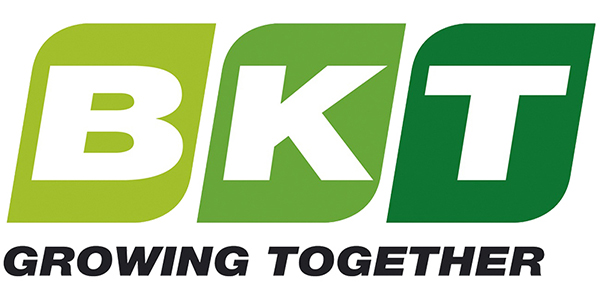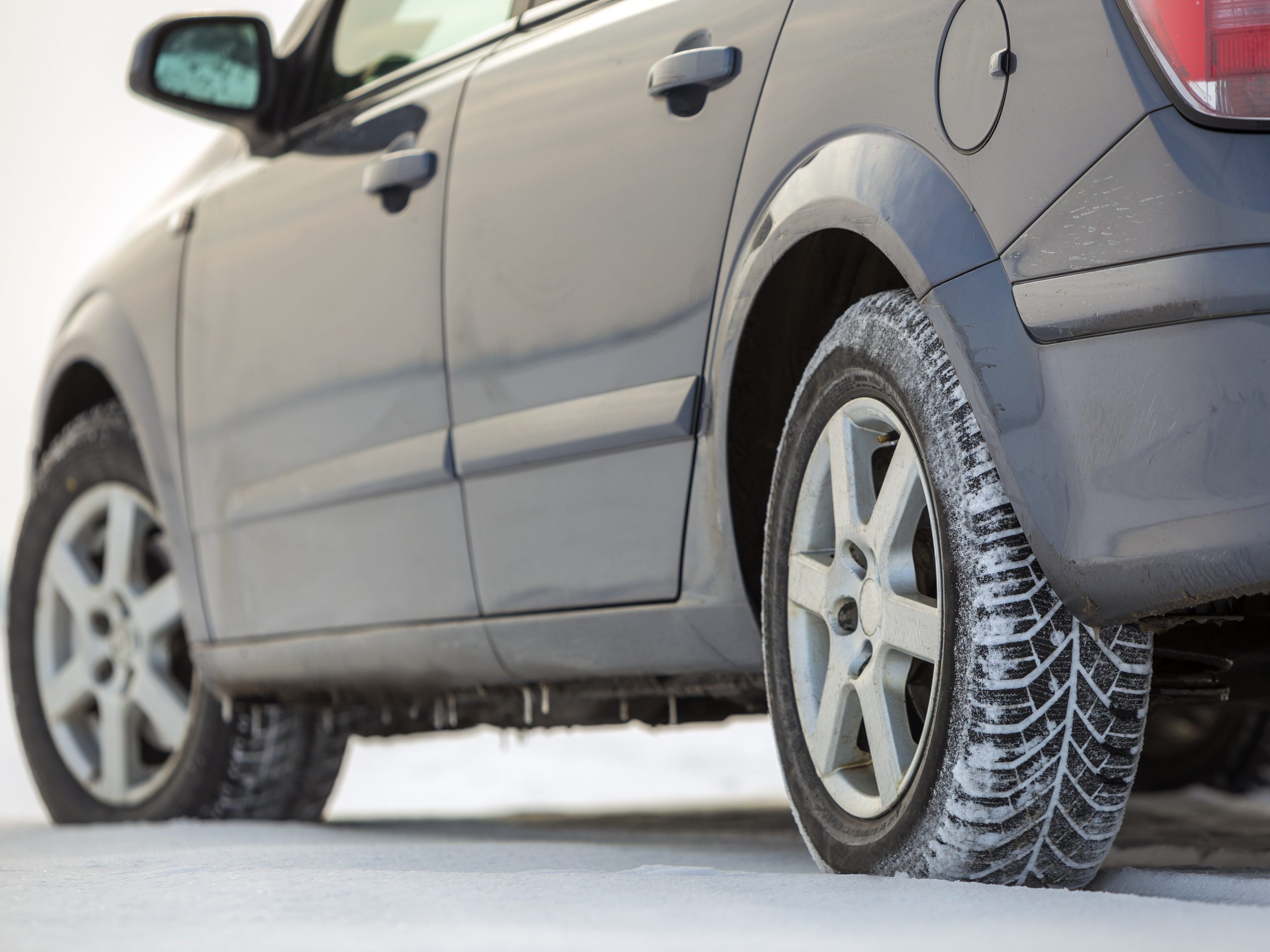
2020 - Winter Tire Report
Most Canadian drivers prefer the safety advantages of winter tires
About This Report
About TRAC’s 2020 National Survey Instrument
An online survey of 1,523 Canadian motorists was completed between October 2-5, 2020, using Leger’s online panel. The margin of error for this study was +/-2.5%, 19 times out of 20.
*Leger is the largest Canadian-owned polling, research and strategic marketing firm. Founded in 1986, Leger has gained an impressive knowledge base, and provides clients access to credible and reliable data. Leger clients include BlackBerry, Bank of Montreal, Johnson & Johnson, LG, L'Oreal, Mastercard, Merck, Microsoft, Migros, Nestle, Pfizer, Quebecor, Samsung, Staples, and Westjet.
Most Canadian drivers prefer the safety advantages of winter tires
Key Findings
TRAC’s 2020 Canadian Consumer Winter Tire Study shows that 81 per cent of winter tire owners believe driving a vehicle equipped with winter tires has saved them from being involved in a potentially hazardous driving situation such as loss of control or a collision. The Study also found that 72 per cent of Canadian motorists now use winter tires; and examined how COVID-19 influenced driving habits, and it is no surprise that 65 per cent of motorists surveyed reported driving significantly less because of the pandemic.
Furthermore, the winter tire category has grown at an annualized rate of five per cent, and winter tires is the fastest growing tire category in the Canadian market (based on statistical analysis of winter tire shipments across Canada within TRAC membership). These statistics only confirm that Canadians embrace the effectiveness, improved handling and safety advantages provided by winter tires.
A past study also demonstrates that winter tire laws, public education, and financial incentives such as lower auto insurance premiums and low interest loans on winter tire purchases represent some of the main drivers when it comes to utilization of winter tires and making Canadian wintertime roadways safer.
Winter tires are seeing remarkable success in Canada and TRAC continues to collaborate with government, industry, road safety organizations and other stakeholders on providing safe winter driving recommendations that include use of winter tires and educating consumers about the safety benefits of winter tires.
Canadian drivers continue to recognize winter tires as the superior option for safe winter driving, and the increasing adoption helps prevent countless collisions and keeps our roads safer. All Canadian drivers should take advantage of shorter stopping distances and superior grip of dedicated winter tires, and recognize them as an important part of their road safety equation.Carol Hochu President & CEO, TRAC
Winter Tire Usage in Canada
TRAC 2020 Canadian Consumer Winter Tire Study
Only 35 per cent of Canadian drivers used winter tiresin 1998. That figure has more than doubled in 2020. TRAC’s 2020 Canadian Consumer Winter Tire Study shows that winter tire usage had grown to 72 per cent in 2020 in comparison to 2017 at 66 per cent, and 2014 at 58 per cent. Excluding Quebec, where the winter tires are mandatory, 65 per cent of the Canadian drivers will use winter tires in the 2020/2021 winter season.
Winter Tire Use by Region
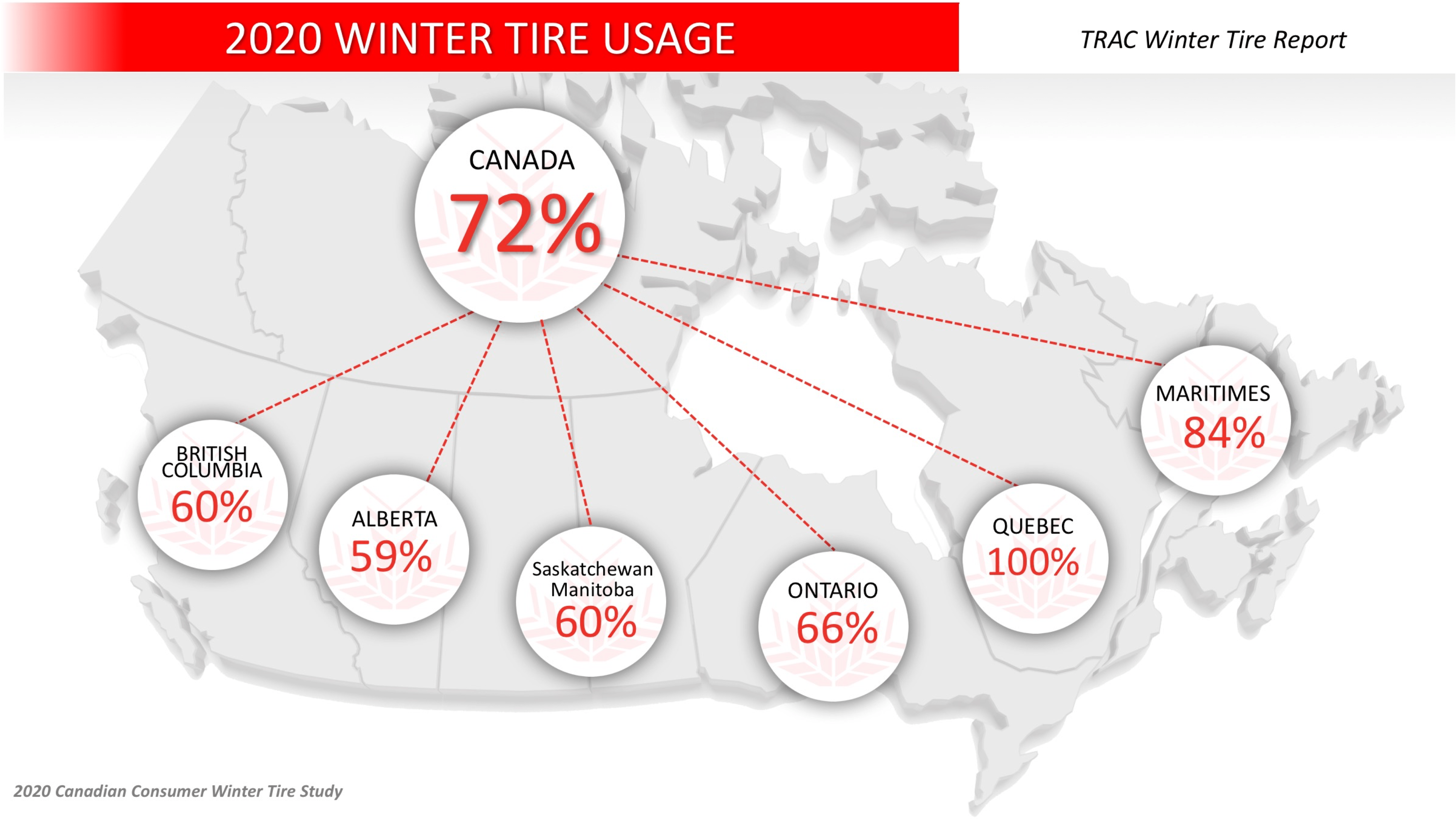
Winter Tire Usage
| Year / Province | 2020 (%) | 2019 (%) | 2018 (%) | 2017 (%) | 2016 (%) | 2014 (%) |
|---|---|---|---|---|---|---|
| National | 72 | 75 | 76 | 66 | 68 | 58 |
| Atlantic Canada | 84 | 91 | 94 | 83 | 81 | 73 |
| Quebec* | 100 | 100 | 100 | 100 | 100 | 100 |
| Ontario | 66 | 69 | 69 | 59 | 65 | 56 |
| Manitoba/Saskatchewan | 60 | 59 | 60 | 48 | 50 | 39 |
| Alberta | 59 | 63 | 70 | 57 | 55 | 45 |
| British Columbia | 60 | 68 | 64 | 60 | 49 | 38 |
* Mandatory winter tire usage since 2008
Driver Perception of Winter Tires

While there is strong trend in utilization of winter tires, three-in-ten motorists outside Quebec still resist winter tires. Top reasons for not owning winter tires are:
Top reasons for not owning winter tires (excluding Quebec)
| Top Reasons | Total* | Atlantic | ON | MB/SK | AB | BC |
|---|---|---|---|---|---|---|
| All-season tires are good enough | 65% | 50% | 67% | 75% | 62% | 63% |
| I don't drive much in winter | 30% | 11% | 31% | 14% | 31% | 40% |
| Too expensive | 27% | 20% | 25% | 12% | 47% | 23% |
| I have no place to store off-season tires | 15% | 20% | 18% | 7% | 10% | 16% |
| Other | 10% | 24% | 12% | 9% | 2% | 10% |
| Don't know/prefer not to answer | 2% | - | 2% | 5% | 3% | 2% |
According to TRAC’s 2018 Canadian Consumer Winter Tire Study, winter tire laws, public education, and financial incentives such as lower auto insurance premiums and low interest loans on winter tire purchases play significant part in motivating drivers to use winter tires and make Canadian wintertime roadways safer. Advice from family and friends also represents a major driver, and the increases in winter tire use link directly with drivers sharing their positive experience with winter tires:
- Winter tire laws (34%)
- Advice from friends and family (17%)
- Lower auto insurance premiums (11%)
- Media coverage (7%)
National Tire Shipments
The Tire and Rubber Association of Canada tracks all tire shipments into the Canadian market from its members, representing more than 80 per cent of the market in Canada.
Based on the statistical analysis of TRAC members’ winter tire shipments across Canada, the winter tire category has grown at an annualized rate of five per cent over the past three years, and this trend has been making winter tires the fastest growing category in the Canadian tire market.*
“TRAC’s statistical overview shows continuous growth in the winter tire market category. This growth suggests increased consumer understanding of the advantages of winter tires and their place as an important part of the vehicle’s safety equipment during the harsh Canadian winter.Barry Yutronkie Director, TRAC
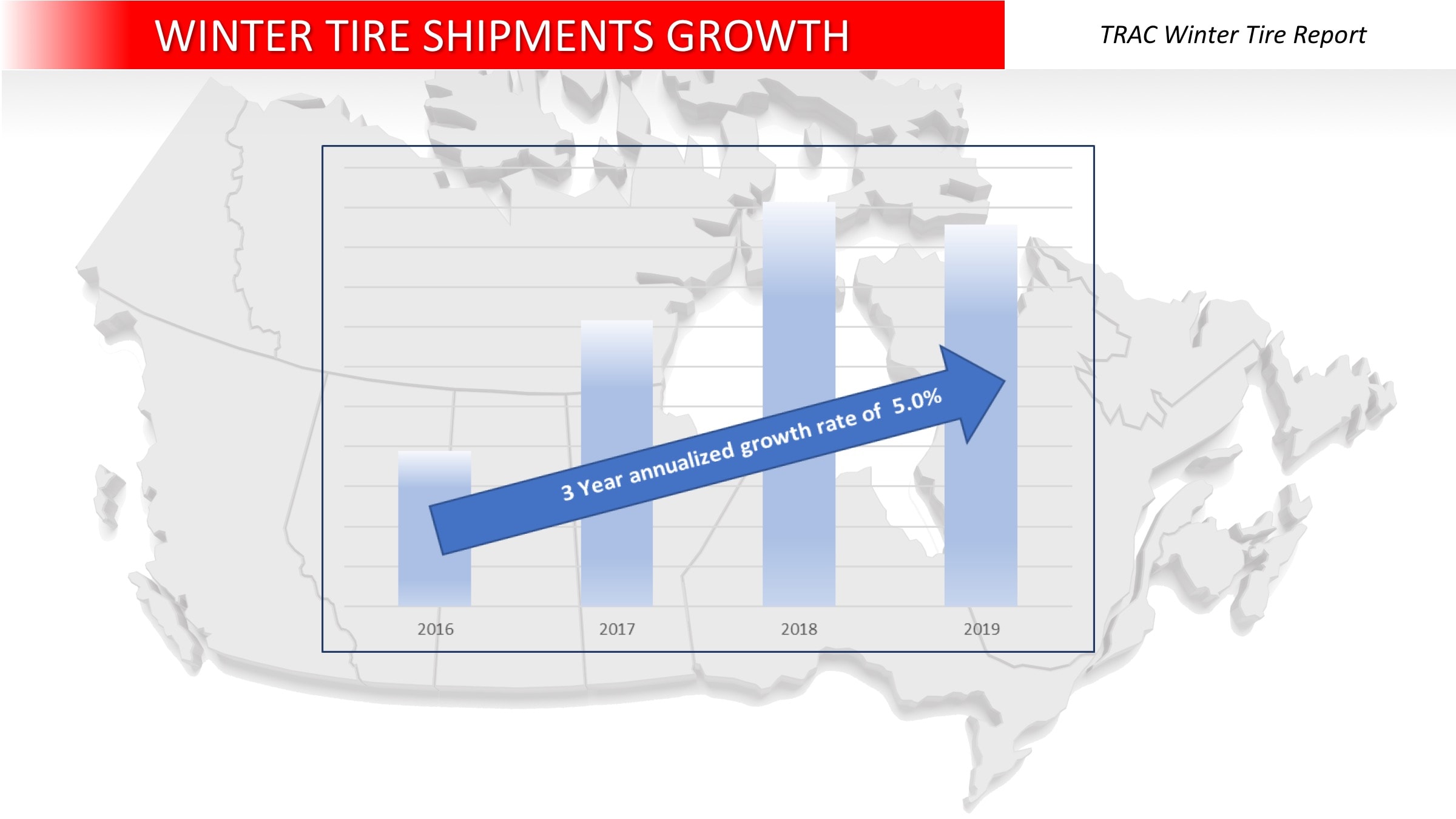
Road Safety—The Case for Winter Tires
The following findings are supported by a report from the Traffic Injury Research Foundation (TIRF; www.tirf.ca) citing a range of studies that show conclusively that winter tires provide superior traction, braking and cornering in all cold-weather driving conditions, whether the road surface is dry, wet, icy or snow- covered. Winter tires play a measurable role in increasing road safety and protecting drivers and traffic participants. The use of winter tires contributes to:
- preventing collisions, injuries and fatalities
- reducing health and hospital emergency costs
- reducing the number of police and ambulance emergency responses during winter
- lowering the frequency and size of insurance payouts
- reducing traffic congestion.
Driving requires your full attention. When driving in winter weather you need to adjust your driving to the conditions and remember that conditions can deteriorate rapidly. Drivers need to know that stopping distances will be much longer on slippery roads and to keep a safe following distance from other traffic. The OPP also encourages the use of winter tires as they can provide extra traction on snowy, cold and icy roads.Kerry Schmidt Manager – Media Relations, Ontario Provincial Police
Quebec—Saving Lives and Reducing Collisions
The superior traction and braking capabilities of winter tires are proven to save lives and reduce personal injuries. The Quebec experience with its mandatory winter tire usage and full data represents the best example.
A 2011 study by Le ministère des Transports du Québec demonstrates the road safety benefits of legislating winter tires. After the first two seasons of enforcement (winter 2008-2009/2009-2010):
- winter road collisions decreased by five per cent
- 574 fewer people were injured annually in winter road collisions
- deaths and serious injuries due to winter road collisions decreased by three per cent.
Analysis and Insights
Canadian government agencies and road safety groups have been very receptive to the safety advantages of winter tires and continue to work toward increased awareness and driver education in this segment, and continue to encourage increased winter tire usage nationwide by providing education, leadership, and guidance. TRAC’s ongoing research into usage of winter tires continues to demonstrate that:
- government mandates, financial incentives, and public awareness campaigns play key role in educating Canadian drivers about safety advantages of winter tires and in persuading them to make the safe choice
- drivers who use winter tires trust in their efficacy as an important vehicle safety feature
- growing winter tire utilization contributes to safer roads, reduction in winter road collisions, injury and costs for thousands of Canadian motorists and their families each year.
TRAC’s role focuses on educating government leaders, interest groups, stakeholders and the public about the safety and performance benefits of winter tires; and has been participating in:
- promoting the safety benefits of winter tires with government bodies and traffic safety organizations
- creating educational resources and campaigns through its consumer-oriented Be Tire Smart brand
- promoting winter tire usage on government fleet vehicles
- winter tire messaging on highway signage
- incorporating winter tire messaging into driver training and handbooks.
Winter Tire Initiatives by Province
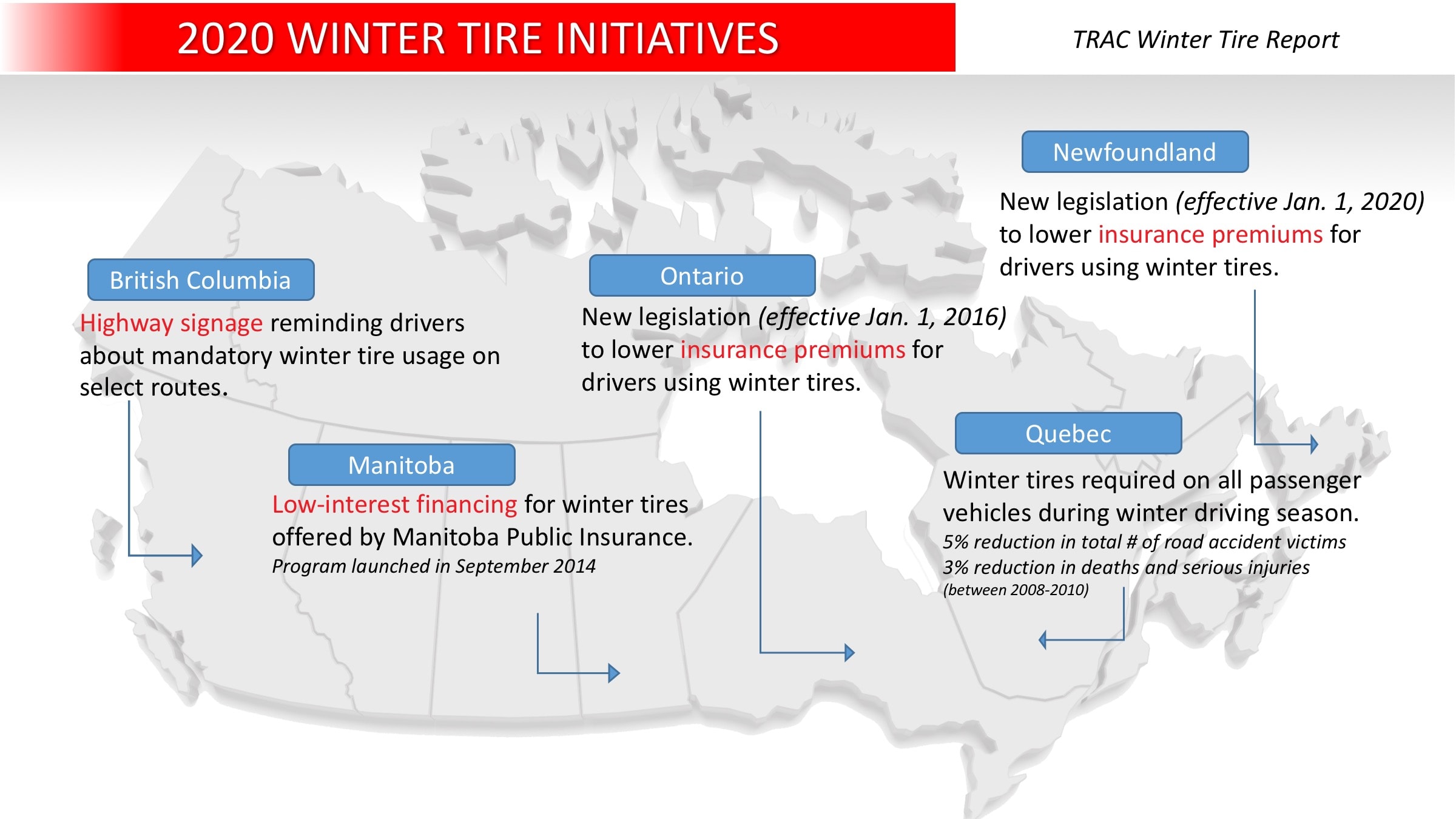
| Province Initiative | |
|---|---|
| British Columbia | Certain mountainous highways require the use of tires marked with the Three-Peak Mountain Snowflake symbol or M+S marking between October 1st and March 31st. |
| Manitoba | Launched in 2014, Manitoba Public Insurance offers low-interest loans for the purchase and installation of qualified winter tires. The program. The loans are to a maximum of $2,000 per vehicle, for up to 48 months at the rate of prime, plus two per cent. Since 2014, more than 71,000 applications have been processed. Find more information about the program at www.mpi.mb.ca. |
| Newfoundland | Effective January 1, 2020, the government of Newfoundland implemented legislation which requires all insurance providers to reduce auto insurance premiums to drivers who have four winter tires installed on their personal passenger vehicles. Motorists are advised to ask their insurer about how to qualify. |
| Ontario | Effective January 1, 2016, the government of Ontario implemented legislation which requires all insurance providers to reduce auto insurance premiums to drivers who have four winter tires installed on their personal passenger vehicles. Motorists are advised to ask their insurer about how to qualify. |
| Quebec | Since 2008, the Province of Quebec has mandated winter tires on all passenger vehicles. Winter tires are required from Dec. 1st, to Mar. 15th. |
Winter Driving Safety Initiatives by Province
British Columbia
The Winter Driving Safety Alliance (shiftintowinter.ca) is a multi-agency working group that shares a common goal of reducing frequency and severity of winter-related motor vehicle crashes. Committed to improving the safety of drivers during the winter months, the Alliance is comprised of more than a dozen public, private and non-profit bodies, including TRAC.
Manitoba
Manitoba Public Insurance (www.mpi.mb.ca) is a non-profit Crown Corporation dedicated to keeping Manitoba’s roads safe and vehicle insurance rates low since 1971. Its mandate includes education on winter driving, and the Winter Tire Program which provides low-interest financing for winter tires to eligible Manitobans.
Newfoundland
Starting on January 1, 2020, Newfoundland enacted changes to the Automobile Insurance Legislation Changes, and insurers in the province are required to provide a discount for winter tires.
Ontario
The Ontario Ministry of Transportation’s Inter-Agency Road Safety Marketing Committee brings provincial road safety partners together to share information, support joint initiatives and develop awareness campaigns. The Agency works with community groups to promote safe and responsible winter driving practices, and increasing public awareness regarding MTO winter maintenance operations.
Traveler Information Services
Most provinces and territories provide drivers with traveler information services. The 511 road conditions service is available in Newfoundland and Labrador, New Brunswick, Nova Scotia, Prince Edward Island, Quebec, Ontario, Manitoba, Alberta and Yukon. In Saskatchewan, the number is 1-888-335-7623 (toll-free in Canada), in British Columbia it’s 1-800-550-4997 (toll-free in North America), and in Northwest Territories it’s 1-800- 661-0750.
Shopping for Winter Tires
Identifying a Winter Tire
A winter tire features the Three-Peak Mountain Snowflake symbol (also referred to as the ‘Alpine Symbol’) on its sidewall. The tire carrying this symbol meets the industry snow traction performance requirements.
A winter tire features the Three-Peak Mountain Snowflake symbol (also referred to as the ‘Alpine Symbol’) on its sidewall. The tire carrying this symbol meets the industry snow traction performance requirements. Winter tire testing is rigorous, reliable and sophisticated. Winter tires marked with 3PMS symbol must follow the ASTM F-1805 tire test on medium-packed snow in standardized testing conditions. These tires are required to meet or exceed minimum industry snow traction requirements.
All winter tires manufactured by TRAC member tire makers undergo thorough and sophisticated testing. The ASTM F-1805 Driving Traction Test is a performance-based standard. Only tires with advanced designs, treads, and rubber compounds can meet or exceed this performance standard. Canadian federal regulation under Transport Canada mandates that all tires that carry the 3PMS symbol must pass this test.
Winter Tire Safety and Performance Benefits
Winter tires provide superior traction and braking on cold-weather road surfaces. The superior grip of today’s high-tech winter tires is the result of more flexible rubber compounds that provide superior traction even at extremely cold temperatures. These specialized rubber compounds coupled with sophisticated tread designs allow for greater control and braking capability on cold, dry, snow-covered, icy or slushy roads. Shorter stopping distances in emergency situations represent the primary safety feature 12 2020 of the advanced technology in today’s winter tires. Research detailed in the study from Traffic Injury Research Foundation (TIRF; www.tirf.ca) shows that:
- at temperatures just below freezing, stopping distances for vehicles with winter tires are as much as 30 per cent shorter than for vehicles with all-season tires
- winter tires deliver better traction on an ice or snow-covered road surface at -30°C vs. all-season tires at 4°C.
Dedicated Winter Tires and Other Winter Tires
Advances in rubber compounding and tire design now offer more choice for consumers when it comes to tires for winter driving. Some dedicated winter tires are designed to perform better in snow, while others are designed to perform better on ice.
While dedicated winter tires are designed specifically for winter conditions, consumers have been introduced to tires which also display the Three-Peak Mountain Snowflake Symbol, however are made to be driven in warmer months as well, while meeting the snow traction performance requirements.
For the very best performance and safety in winter driving TRAC recommends dedicated tires manufactured specifically for winter road conditions. These tires are designed only for use during winter months and should be removed during the non-winter seasons as the tread compound is much too soft for summer driving.
All-Season Tires
As noted earlier, over 50 per cent of drivers currently not using winter tires believe that all-season tires offer sufficient traction and stopping power in winter road conditions. An “all-season” tire implies that it is suitable for all weather conditions; however, these tires do not have the Three-Peak Mountain Snowflake symbol, and do not meet the necessary snow traction requirements to be considered a winter tire.
All-season tires are a compromise when it comes to traction and stopping power during winter driving season.
About Tire and Rubber Association of Canada
The Tire and Rubber Association of Canada (TRAC; www.tracanada.ca) is the national trade association representing tire makers, rubber product manufacturers and importers as well as rubber recyclers and suppliers of goods and services related to the industry. TRAC is committed to educating drivers regarding proper tire care, maintenance, and usage. A key advocacy goal in the cold-weather months is to raise awareness of safe winter driving as well as the safety and performance benefits of winter tires.
Trusted by

